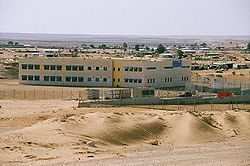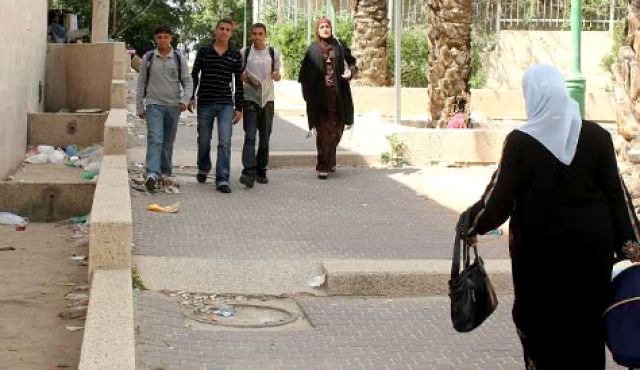Israeli Bedouin stage mass protest in wake of home demolition orders
 Thursday, October 18, 2012 at 11:36PM
Thursday, October 18, 2012 at 11:36PM by Yanir Yagna Haaretz 18 October 2012
Residents in recognized village of Bir Hadaj received demolition orders last week, accuse Israeli state of trampling on their rights as citizens.
Some 2,000 Bedouin from the Negev town of Bir Hadaj staged a demonstration on Thursday morning outside of the government offices in Be'er Sheva, demanding the state rescind its plan to demolish homes in their community.
 ORT School in Bir Hadaj
ORT School in Bir Hadaj
The demonstrators accused the state of trampling on their right as citizens by enacting the plan to destroy their homes in the village, which has been recognized by Israel as a legitimate sector in the Abu Basma Regional Council.
The main entrances at the court and government offices were blocked by a large police force during the demonstration.
Protesters raised placards demanding that the government halt its "abuse" of Bedouins in the Negev, shouting: "Yes to recognition! No to destruction!"
The director of the Adalah Legal Center for Minority Rights, Thabet Abu Rass, called the state's move a "war of destruction" against the Bedouin communities.
"This demonstration is being held in the wake of a [police] attack on the village," said Abu Rass. "Despite being a recognized village, none of the residents have received permits to build new houses. While the media is busy with the elections, the state has opened a war of destruction against the Bedouin villages."
Interior Ministry officials escorted by a large number of policemen entered the village last week to deliver demolition orders. A confrontation erupted and police officers used tear gas, shock grenades, and sponge bullets to stymie the protest.
"We're demonstrating because as a result of the demolitions, there are people in the town who have no roof over their heads," A resident of Bir Hadaj, Ayash Abu Assa, told Haaretz. "The police decided to attack us. They want to prove that they are in control and that there's nothing we can do about it."
MK Ibrahim Sarsur (United Arab List-Ta’al) joined the demonstration on Thursday, declaring its purpose "to tell the state of Israel that enough is enough, to protest government policies towards the Arab population."
"We're entitled to equal rights and full participation in planning in the Arab community in general, and among the Bedouin in particular," said Sarsur. "This just isn't happening."
The Bedouin Settlement Authority, which serves under the auspices of the Housing Ministry, said in response to the complaints:
"The Authority is always open to deal with the regularization of Bir Hadaj residents, as evident by meeting we held last Monday with the town's representatives aimed at promoting their settlement in plots and land awaiting them.
(see below the state of Bedouin townships that the Prawer plan intends for moving these Bedouin)
----------------------------------------------------------------------------------------------------------------------------
Rahat schools plagued by filth, neglect
A Health Ministry report obtained by Haaretz shows severe health hazards in all the other schools in the Bedouin town. A team of ministry officials who visited the town two weeks after the school year began reported disgraceful findings.
http://www.haaretz.com/print-edition/news/rahat-schools-plagued-by-filth-neglect-1.394883
Behind the main building of the Ibn Sina elementary school in Rahat stand dozens of prefabricated structures that serve as classrooms for 600 children. A heavy stench rises from four broken toilet stalls on the path leading to the rooms. These are the only toilets available to 600 students during the school day - one per every 150 students.
"Nothing has changed," said Khaled Altalala, chairman of the central parents committee in the southern town.
The floor in the toilet facility is filthy and covered with black stains, the windows are broken, the toilet bowls are dirty and toilet paper and soap are nowhere to be found.
"Some children simply don't go all day," said Altalala. "But nobody cares."
Altalala's repeated pleas before the school year started apparently made no difference. He wrote to the mayor, the Education Ministry director general, the Health Ministry and the school principals committee. Some of his letters were answered, but nothing was done about the situation.
A Health Ministry report obtained by Haaretz shows severe health hazards in all the other schools in the Bedouin town. A team of ministry officials who visited the town two weeks after the school year began reported disgraceful findings, said the ministry's southern district engineer Hadassa Adan in a letter to Mayor Faiz Abu Sahiban.
"The situation is appalling as far as sanitation, cleanliness and maintenance are concerned, and the infrastructures are deficient. Most of the schools lack adequate sanitary facilities for the children and staff," she wrote.
"In recent years we have paid several visits to schools in the town and sent you many reports about the inferior sanitary situation in the schools, but the problems have not been fixed," she wrote.
The report details the deficiencies, noting for example that the girls' toilets in the junior high Al Nur Rahat "are unclean," and that "feces were found on the walls," "some of the stalls are out of order," "some of the water faucets are broken," and "the toilet seats are extremely dirty."
On October 2, a month after the school year had started and the report was sent, the Education Ministry's southern district director Amira Haim sent a letter to Rahat's mayor saying the ministry would not allow the schools to operate unless an immediate change was made.
Ten days later, Dr. Yitzhak Kadman, chairman of the National Council for the Child, also wrote a letter to the Education Ministry.
"The schools are a serious health and safety hazard. ... They also constitute an infringement of the children's basic human rights, in addition to the danger they pose to their health and safety."
"I don't understand the Education Ministry," said Altalala. "How does it continue transferring funds [to the municipality] when it sees nothing is being done? These students and principals are part of the education system."
The Rahat municipality said it "instructed the principals to monitor the cleanliness personally."
"Already at the beginning of the month, following repeated complaints, we asked the contractor to replace the cleaning workers in five schools," the municipality said. "If the situation does not improve significantly by December 24 we will issue a new tender."
The contractor Agudat Hashomrim responded that it is "making constant efforts to improve the cleanliness standard and conduct and finance close supervision."
"The maintenance level makes it difficult to keep the facilities clean and is not our responsibility," the contractor added.
The Bedouin community has an estimated 107,000 children and youth, only 75,000 of whom are enrolled in schools. Dealing with the high dropout rate requires additional inspectors to trace truant students and children in danger of dropping out of the system.
The Education Ministry reported to the Knesset in June 2010 that it needs 55 more inspectors for Bedouin schools. However, only 14 inspector posts are allocated for the current school year, of which only 11 are manned. In two Bedouin communities, for example, Lakia and Tel Sheva, there are 11,000 school children, but no inspectors at all. In Rahat, with its 19,000 children, there are only four inspectors.
The Education Ministry says the situation was caused by the recent reforms in the ministry. "A visiting inspector must have a teaching certificate and experience," the ministry said. "The new reforms, which have improved the teachers' wages, make it more difficult to find teachers willing to work as inspectors and give up the improved wages."
 APJP |
APJP |  Post a Comment |
Post a Comment | 